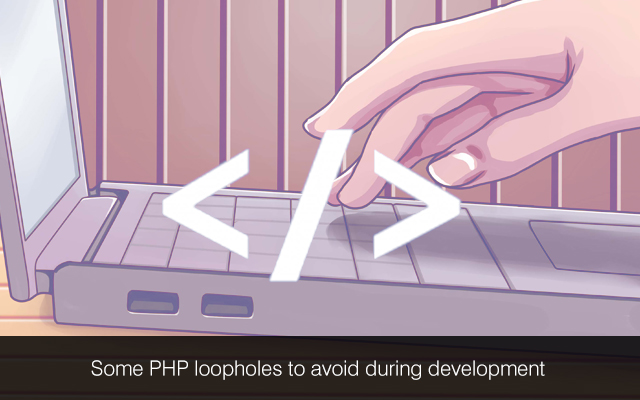Some PHP Loopholes to Avoid During Development
 The job of a PHP development might look quite a lucrative one but it is not at all a cake walk. In fact, it is far from that. PHP development indeed is an intricate job that needs a thorough knowledge on the subject backed by a reasonable experience. Even then, flaws and hiccups cannot be totally avoided. In fact, there are instances when developments have been seriously thwarted or plagued by mistakes or flaws. Hence, it is imperative that a hard look is taken at the loopholes or flaws that generally plague PHP development. Knowing the loopholes would help the developers to avoid them during the development.
The job of a PHP development might look quite a lucrative one but it is not at all a cake walk. In fact, it is far from that. PHP development indeed is an intricate job that needs a thorough knowledge on the subject backed by a reasonable experience. Even then, flaws and hiccups cannot be totally avoided. In fact, there are instances when developments have been seriously thwarted or plagued by mistakes or flaws. Hence, it is imperative that a hard look is taken at the loopholes or flaws that generally plague PHP development. Knowing the loopholes would help the developers to avoid them during the development.
Not changing the version
One of the golden rules of software development is that the developer should always work on the very latest version of a software package. PHP in this aspect is no exception. This is mainly because the latest version of any software always takes care of the bugs and all the known vulnerabilities that have plagued the older editions. Hence, possibilities of committing mistakes or leaving flaws in the development get minimized by a significant extent. However, there are a few lazy developers who always keep away from upgrading the version if and when needed. This results in a lot of flaws subsequently. Hence, this version upgrade should always be done to minimize the chances of mistakes.
Using user inputs that are not validated
Developers often skip validating the inputs made by the users through various forms and entry fields or in the form of arguments in the URL strings. This is a terrible mistake that they end up making and is a major security flaw in PHP development. One must never trust these inputs for there are a huge number of people who do not have anything else to do with their lives, other than using the internet to damage other’s works. Hence, using un-validated inputs or those which are not properly validated triggers of a lot of exploits that jeopardize the development resulting in disastrous consequences.
Faulty Access Control
Another very common loophole that the developers end up making is faulty access controls, or in other words, indulging in flaws or errors in access control. This issue is particularly dangerous as this opens up the access of the system to unauthorized personnel, and displays confidential or sensitive information to those who are not supposed to get access to the information. When seen from another point of view, the larger viewership or more access increases the venerability of the software by a considerable extent, which is not what anyone would want.
Hence, it is imperative that the developers check out the access privileges of the users upon each and every load of a page that have restricted access of the application. It is important to check the credentials of the users on the index page. However, a user with unscrupulous intention would directly enter the URL on any other page that is ‘deeper’ and this will ostensibly help the person avoid this process of checking the credentials.
Therefore, it is better to use a multi layered security system that will make unauthorized access much tougher. For instance, applications can be written only for the users who have fixed IPs. Hence, placing the pages with confidential information or with restricted access in an altogether separate directory protected by an .htaccess file can be practiced to restrict access by unauthorized users.
Maintaining vulnerable session Ids
This is another mistake that may cause hijacking of session IDs, which can in turn trigger off serious security concerns for websites that are based on PHP. This language comes up with a session tracking mechanism or component that uses a distinct or unique ID for any session used by any user. When there is any attack on the system, it is this ID that is at first targeted to gain unauthorized access to the account in question.
Now it is true that session IDs cannot be made absolutely foolproof. Yet, there are certain practices that would help limit the damage or at least limit the chances of such damages. One of these practices is denying a session user the right of entering any new password, without entering his or her already existing password. Also, refraining from auto displaying sensitive or confidential data like credit card number or Social Security Number is another very credible practice. This would help you leverage the benefits of PHP certified professionals when hiring services of a PHP web development India company.
We provide PHP web development services. To hire PHP developer India from us, please reach out to us at Mindfire Solutions.